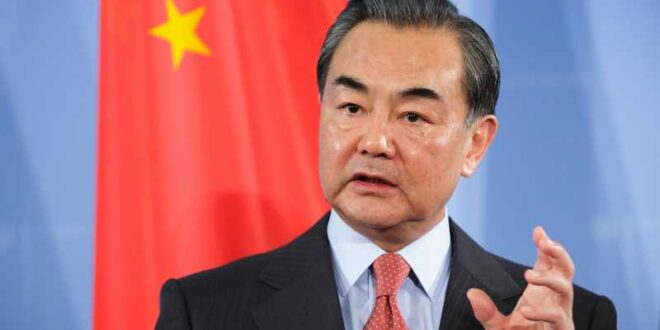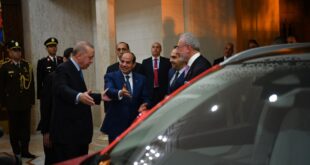wagdy Abd aziz
In a move reflecting renewed strategic commitment, Chinese Foreign Minister Wang Yi affirmed, during his meeting with Moroccan Foreign Minister Nasser Bourita in the Chinese capital, the necessity of adhering to the two-state solution as the foundation for peace in the Middle East. In statements carried by China’s official Xinhua News Agency, Wang emphasized rallying “greater international consensus” and forming “a more unified stance” on the Palestinian issue, calling for support of full Palestinian membership in the United Nations based on international recognition of an independent State of Palestine.
This announcement came amid discussions on the current situation in Palestine and the Israeli-Palestinian conflict, where Wang expressed “deep concern and profound regret” over the conflict’s continuation for two years, which has led to an “unprecedented humanitarian catastrophe” in Gaza. He called for an immediate comprehensive ceasefire to alleviate human suffering, holding countries with special influence over Israel—particularly the United States—accountable for “seriously shouldering their responsibilities.” He also stressed the role of the UN Security Council and humanitarian agencies in fulfilling their duties, stating that the principle of “Palestinians governing Palestine” must be implemented in earnest, and that Gaza and the West Bank are inalienable Palestinian territories. Furthermore, he added that any arrangements regarding governance or post-war reconstruction must respect the will of the Palestinian people and safeguard their legitimate rights, rejecting any unilateral actions that undermine the two-state solution.
This stance comes at a time when the Middle East is witnessing ongoing escalation, with Israel’s invasion of Gaza resulting in the deaths of tens of thousands and the displacement of millions, making China’s call for international unity a decisive step toward advancing the Palestinian file. The meeting with Morocco, a strong Arab ally, is part of Beijing’s efforts to enhance coordination with Arab and Islamic countries, within the framework of its active diplomatic initiative in the region.
China’s Historical and Current Role in Supporting the Palestinian Cause: Between Rhetorical Backing and Practical Initiatives
Since the founding of the People’s Republic of China in 1949, the Palestinian cause has been a cornerstone of Chinese foreign policy, rooted in historical ties to the struggle against colonialism and imperialism. China recognized the State of Palestine in 1988 and has supported the Palestinian national liberation movement (the Palestine Liberation Organization) since the 1970s, providing covert military and training aid to fedayeen fighters during the 1960s and 1970s. This historical support has positioned Beijing as a reliable partner for Palestinians, viewing their cause as a model for resistance against Western hegemony, especially from the United States.
In the modern era, China’s role in supporting the Palestinian cause manifests through a blend of political diplomacy and developmental aid, while maintaining a delicate balance in its economic relations with Israel. In 2025, China reaffirmed its steadfast position in support of establishing an independent Palestinian state on the June 4, 1967 borders, with East Jerusalem as its capital, rejecting Israeli settlements, annexation, and forced displacement. In March 2025, it reiterated its “full support for Palestinian rights,” demanding a halt to Israeli aggression, lifting the siege on Gaza, and enabling Palestine to exercise its sovereignty, while opposing the use of Gaza as a “bargaining chip in a regional deal.”
Among practical initiatives, China’s Special Envoy for the Middle East proposed five steps in July 2025 to end the crisis, including an immediate ceasefire, strengthening internal Palestinian dialogue, and supporting reconciliation among Palestinian factions, considering Palestinian unity “a primary path to statehood.” China also contributed to the Beijing Agreement on Palestinian Reconciliation in April 2025, which factions welcomed as a step toward unity. Economically, Beijing has provided millions of dollars in developmental aid for Gaza’s reconstruction, including infrastructure and renewable energy projects, under the framework of the “Belt and Road Initiative,” linking Palestine to China’s economic network.
Diplomatically, China has leveraged its influence in the United Nations to support resolutions related to the cause, such as voting in favor of full Palestinian membership, and in August 2025 called for a “pro-Palestinian neutrality” that transforms the issue into a confrontation with the West, particularly countries biased toward Israel. However, some experts criticize China’s support as “more rhetorical than practical,” due to its avoidance of economic pressure on Israel to preserve trade partnerships, positioning it as a tool in geopolitical competition with Washington.
In recent meetings, such as those in August 2025 with Arab diplomats, China affirmed its “steadfast and supportive” position on the cause as the “top Arab priority,” participating in discussions on the situation amid regional changes.
Conclusion: Toward a Multipolar World Supporting Justice
Wang Yi’s statements reinforce China’s image as a global power seeking to reshape the Middle East based on principles of justice and sovereignty, leveraging its historical support for Palestine to enhance its diplomatic influence. However, the challenge remains in translating this support into greater practical pressures, especially amid ongoing Israeli violations. If China succeeds in rallying international consensus, its gateway to the two-state solution could be the key to sustainable peace, transforming the Palestinian cause from a humanitarian tragedy into a model for international cooperation.
 موقع وجه أفريقيا موقع وجه أفريقيا هو موقع مهتم بمتابعة التطورات في القارة الأفريقية
موقع وجه أفريقيا موقع وجه أفريقيا هو موقع مهتم بمتابعة التطورات في القارة الأفريقية



